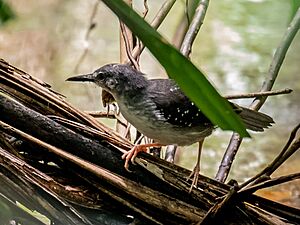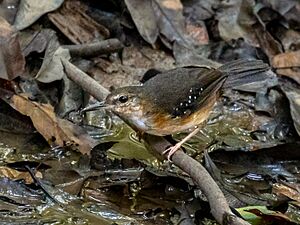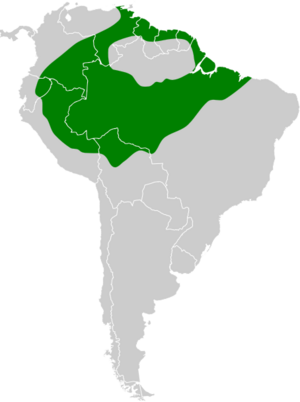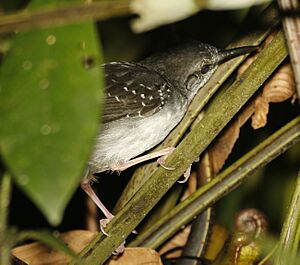Silvered antbird facts for kids
Quick facts for kids Silvered antbird |
|
|---|---|
 |
|
| male | |
 |
|
| female | |
| Conservation status | |
| Scientific classification |
|
| Kingdom: | Animalia |
| Phylum: | Chordata |
| Class: | Aves |
| Order: | Passeriformes |
| Family: | Thamnophilidae |
| Genus: | Sclateria Oberholser, 1899 |
| Species: |
S. naevia
|
| Binomial name | |
| Sclateria naevia (Gmelin, JF, 1788)
|
|
 |
|
| Script error: The function "autoWithCaption" does not exist. | |
| Synonyms | |
|
Sitta naevia |
|
Script error: No such module "Check for conflicting parameters".
The silvered antbird (Sclateria naevia) is a small passerine bird that belongs to the antbird family. It's the only type of bird in its group, called Sclateria. You can find these birds living in warm, tropical parts of South America. They live from central Brazil all the way to Colombia, Trinidad, Peru, and Bolivia.
How It Got Its Name
Scientists give official names to all living things. The silvered antbird was first described in 1788 by a German naturalist named Johann Friedrich Gmelin. He gave it the name Sitta naevia.
Later, in 1899, an American bird expert named Harry C. Oberholser created a special group just for this bird. He named this group Sclateria to honor another bird expert, Philip Sclater. The word naevia comes from Latin and means "spotted," which describes the bird's look.
What It Looks Like
The silvered antbird is usually about 15 centimeters (about 6 inches) long. It weighs around 20 grams, which is about as much as four nickels.
The male silvered antbird has dark grey feathers on its back. Its wings are also dark, with two rows of white spots. Its belly is white with many grey streaks.
The female looks a bit different. She has dark brown feathers on her back. Her wing spots are buff (a light yellowish-brown color). Her belly also has grey streaks, but they are more spread out.
These birds have a loud call that sounds like pi-pi-pi-pi-pi-pi-pi. This call is often the first sign that they are nearby, especially in their dense habitat.
Where It Lives and What It Does
The silvered antbird is a shy bird that lives in wet, shady areas. You can often find it hiding in thick plants or under trees near streams, lagoons, or swamps.
These birds usually live in pairs. They look for food on the ground, often among fallen leaves or on the surface of the water. They mostly eat small insects and other tiny creatures like spiders.
 | Emma Amos |
 | Edward Mitchell Bannister |
 | Larry D. Alexander |
 | Ernie Barnes |



